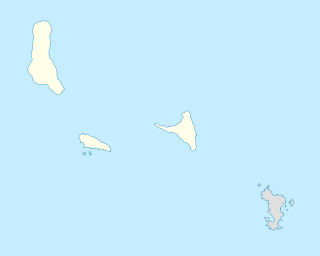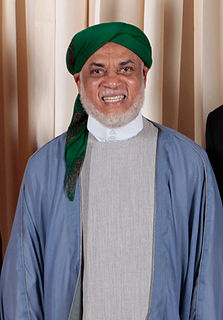 |
|---|
| This article is part of a series on the politics and government of the Comoros |
A presidential election was held in Anjouan on 15 June and 29 June 2008 following the 2008 invasion of Anjouan to oust Mohamed Bacar as President of Anjouan. [1] The election was won by Moussa Toybou, who defeated Mohamed Djaanfari in the second round.

Anjouan is an autonomous high island in the Indian Ocean that forms part of the Union of the Comoros. Its chief town is Mutsamudu and, as of 2006, its population is around 277,500. The total area of the island is 424 square kilometers.

The invasion of Anjouan, on 25 March 2008, was an amphibious assault led by the Comoros, backed by African Union (AU) forces, including troops from Sudan, Tanzania, Senegal, along with logistical support from Libya and France. The objective of the invasion was to topple Colonel Mohamed Bacar's leadership in Anjouan, an island in the Union of Comoros, when he refused to step down after a disputed 2007 election, in defiance of the federal government and the AU. The Comoros archipelago in the Indian Ocean has had a fractious history since independence from France in 1975, experiencing more than 20 coups or attempted coups.
Colonel Mohamed Bacar was President of Anjouan, one of the three autonomous islands that make up the Union of the Comoros, from 2001 to 2008. He is a former chief of police on Anjouan and has studied extensively in France and the United States. He was part of a military coup on Anjouan in August 2001 and soon became President. It is alleged he rigged the elections to become the first president of Anjouan in March 2002, in part due to his leading role in the separatist movement. He was ousted by the combined forces of the Government of the Union of Comoros and the African Union in the March 2008 invasion of Anjouan.
About 128,000 people were eligible to vote, and there were 240 polling stations. [2] Five candidates were qualified to contest the election: Bacar Abdou (deputy for Mutsamudu), Bastoine Soulaimane (a judge and former president of the Anjouan Court of Appeal), Mohamed Djaanfari (former vice-president of the Assembly of the Union of the Comoros), Moussa Toybou (a former minister in Said Mohamed Djohar's government) and Soundi Abdoulatuf (a French military veteran). [3] [4] These candidates were approved by the Constitutional Court on May 20. [3]

Mutsamudu is the second largest city in the Comoros, founded in 1482. It is also the capital and largest city on the island of Anjouan as well the former home of former Comorian president Ahmed Abdallah Mohamed Sambi. It now houses a deep water port, an ancient citadel, and narrow streets with many shops and small crafts. The population in 2010 stood at 25,471.

The unicameral Assembly of the Union of the Comoros is the country's legislative body.
Said Mohammed Djohar was a Comorian politician who served as the 4th President of the Comoros during the 1990s.
Voting for the first round on 15 June, although scheduled to begin at 7am, was delayed by an hour in the main cities, Mutsamudu and Domoni, due to the late arrival of ballot papers or electoral officials. [2] First round turnout was placed at 42.79%. [5]

Domoni is the second largest city on the Comorian island of Anjouan in the Indian Ocean and is located on the east coast of the island. It was the capital of the island in the past while the present capital of Anjouan is Mutsamudu.
Djaanfari (with 42.3%) and Toybou (with 42.5%) advanced to the second round on 29 June 2008, [6] separated by only 88 votes. The other three candidates received between 5.8% and 4.6%. [7]
Toybou was considered a newcomer to politics. He said that he knew "the mechanisms to lift Anjouan out of under-development", and he supported allowing some of those who served under Bacar to remain in administrative roles due to their experience and the need for reconciliation. [8] He also enjoyed the support of President of Comoros Ahmed Abdallah Sambi, [5] [8] while Djaanfari was better known to the local population due to his prior political work.
Campaigning for the second round began on June 21. [5] Toybou won the run-off with 52.37% to Djaanfari's 47.63%, with a turnout of 48.98%; the results had to be validated by the Constitutional Court within three days. [9] Djaanfari contested the result. [10] Turnout in the second round was reportedly higher than in the first one. [11]
The final official result, as confirmed by the Constitutional Court on 3 July 2008, was:
- Toybou – 52.42%, 30,941 votes
- Djaanfari – 47.58%, 28,084 votes
Toybou was to be sworn in on 5 July 2008. [12]




